Featured Events
All News
News

Professor Gurven and Grad Student Garcia in the News
Study finds 80-year-olds in central Bolivian forager-farming population have the same arterial age as Americans in their mid-50s.
Continue Reading Professor Gurven and Grad Student Garcia in the News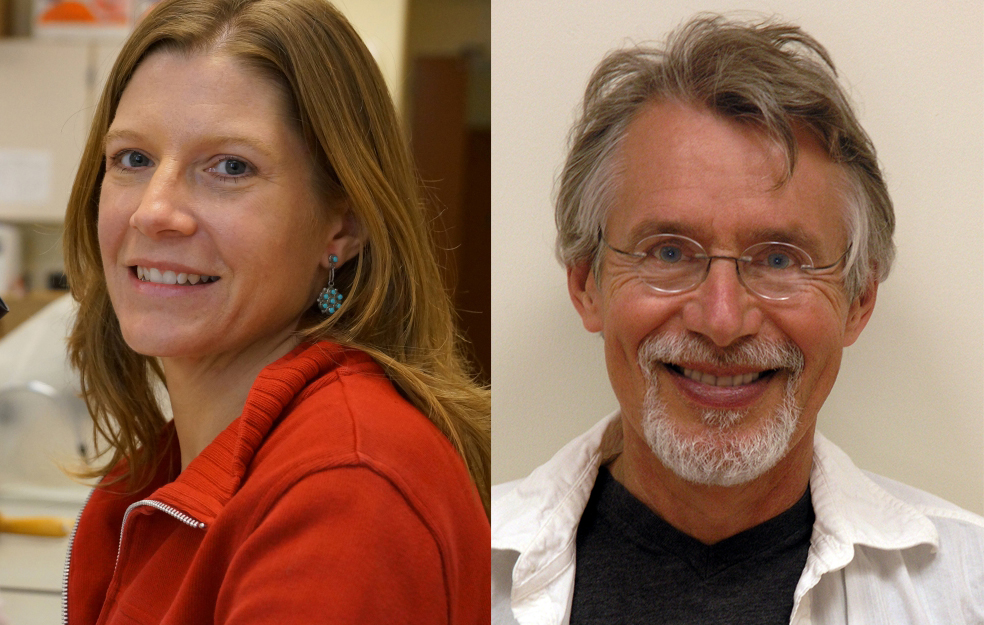
Professors VanDerwarker and Gaulin in Teaching and Learning Excellence Series (TALES) Podcasts
Steve Gaulin appears in the first video at the top and Amber VanDerwarker is in the second at the bottom.
Continue Reading Professors VanDerwarker and Gaulin in Teaching and Learning Excellence Series (TALES) Podcasts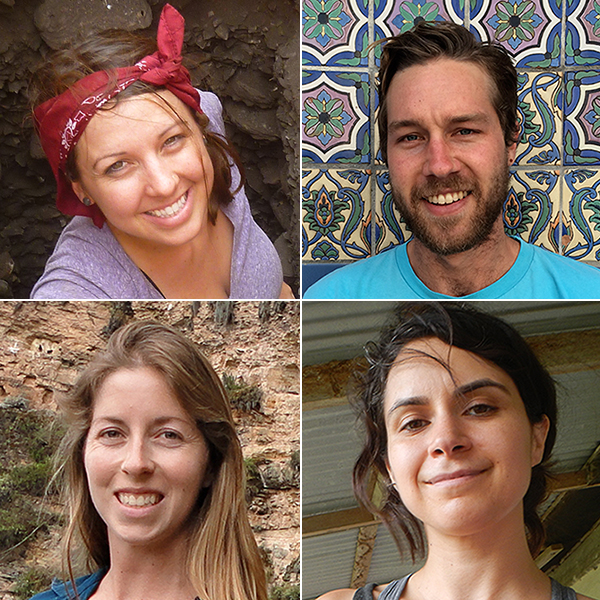
VanDerwarker & Grad Students Present Research
UCSB scholars organize a symposium that will examine mentorship and sexual harassment in academic and private archaeology.
Continue Reading VanDerwarker & Grad Students Present Research
VanDerwarker & Grad Students Present Research
UCSB scholars organize a symposium that will examine mentorship and sexual harassment in academic and private archaeology.
Continue Reading VanDerwarker & Grad Students Present Research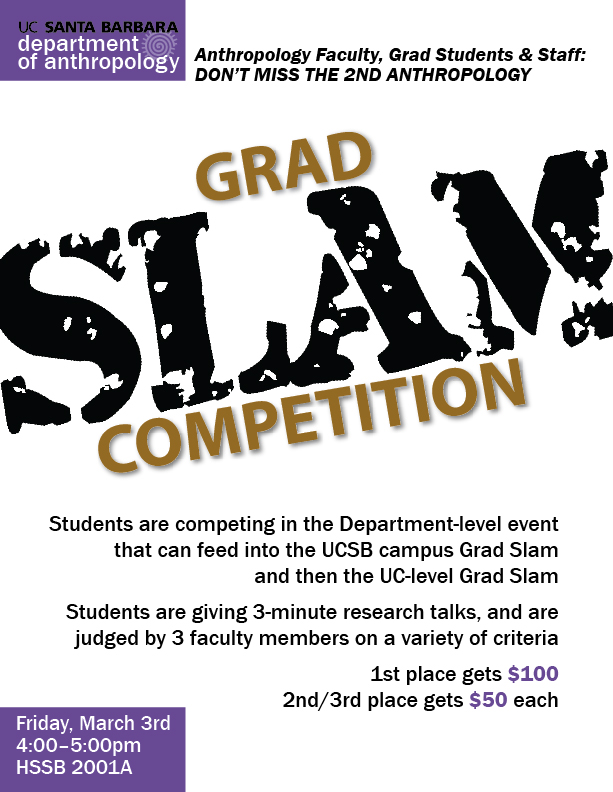
Department Grad Slam Results
1st Place and “People’s Choice Award”: Hugh Radde, et al., Sexual Harassment Among California Archaeologists
2nd Place: Carmen Hové, Immune Modulation During Pregnancy for Women in a High Pathogen Environment
3rd Place: Elisabeth Rareshide, Outside of the Reach of the Mission Bell: Chinigchinich Ritual Practice among the Tongva during the Mission Period in Alta California (AD 1769-1834)
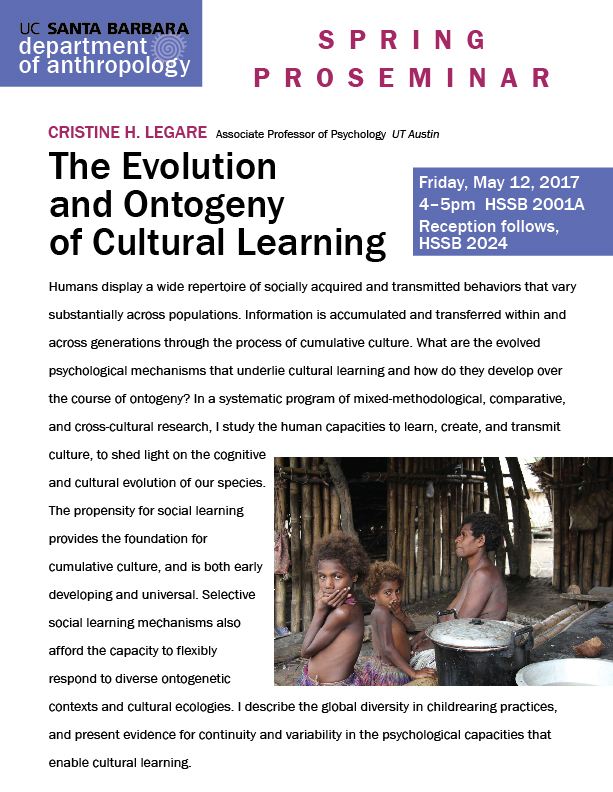
Spring Proseminar: Cristine Legare
The Evolution and Ontogeny of Cultural Learning
CRISTINE H. LEGARE, Department of Psychology, University of Texas at Austin
Humans display a wide repertoire of socially acquired and transmitted behaviors that vary substantially across populations. Information is accumulated and transferred within and across generations through the process of cumulative culture. What are the evolved psychological mechanisms that underlie cultural learning and how do they develop over the course of ontogeny? In a systematic program of mixed-methodological, comparative, and cross-cultural research, I study the human capacities to learn, create, and transmit culture, to shed light on the cognitive and cultural evolution of our species. The propensity for social learning provides the foundation for cumulative culture, and is both early developing and universal. Selective social learning mechanisms also afford the capacity to flexibly respond to diverse ontogenetic contexts and cultural ecologies. I describe the global diversity in childrearing practices, and present evidence for continuity and variability in the psychological capacities that enable cultural learning.
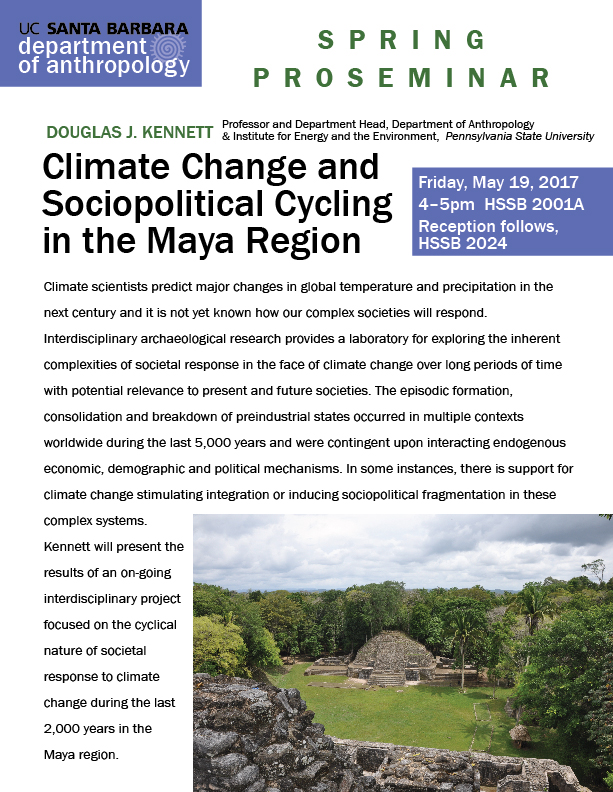
Spring Proseminar: Douglas J. Kennett
Climate Change and Sociopolitical Cycling in the Maya Region
DOUGLAS J. KENNETT, Professor and Department Head Department of Anthropology & Institute for Energy and the Environment, Pennsylvania State University
Climate scientists predict major changes in global temperature and precipitation in the next century and it is not yet known how our complex societies will respond. Interdisciplinary archaeological research provides a laboratory for exploring the inherent complexities of societal response in the face of climate change over long periods of time with potential relevance to present and future societies. The episodic formation, consolidation and breakdown of preindustrial states occurred in multiple contexts worldwide during the last 5,000 years and were contingent upon interacting endogenous economic, demographic and political mechanisms. In some instances, there is support for climate change stimulating integration or inducing sociopolitical fragmentation in these complex systems. Kennett will present the results of an on-going interdisciplinary project focused on the cyclical nature of societal response to climate change during the last 2,000 years in the Maya region.
Continue Reading Spring Proseminar: Douglas J. Kennett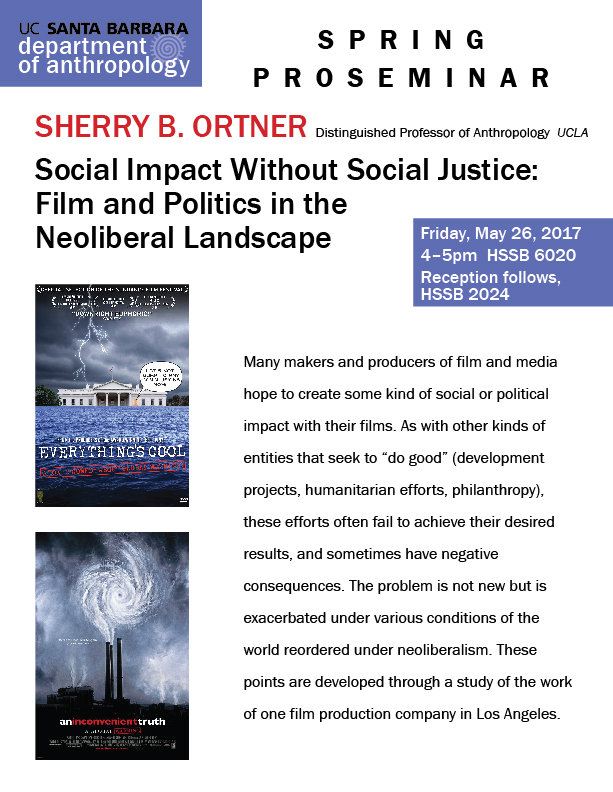
Spring Proseminar: Sherry B. Ortner
Social Impact Without Social Justice: Film and Politics in the Neoliberal Landscape
SHERRY B. ORTNER, Distinguished Professor of Anthropology, UCLA
Many makers and producers of film and media hope to create some kind of social or political impact with their films. As with other kinds of entities that seek to "do good" (development projects, humanitarian efforts, philanthropy), these efforts often fail to achieve their desired results, and sometimes have negative consequences. The problem is not new but is exacerbated under various conditions of the world reordered under neoliberalism. These points are developed through a study of the work of one film production company in Los Angeles.
Continue Reading Spring Proseminar: Sherry B. OrtnerSHERRY B. ORTNER, Distinguished Professor of Anthropology, UCLA
Many makers and producers of film and media hope to create some kind of social or political impact with their films. As with other kinds of entities that seek to "do good" (development projects, humanitarian efforts, philanthropy), these efforts often fail to achieve their desired results, and sometimes have negative consequences. The problem is not new but is exacerbated under various conditions of the world reordered under neoliberalism. These points are developed through a study of the work of one film production company in Los Angeles.